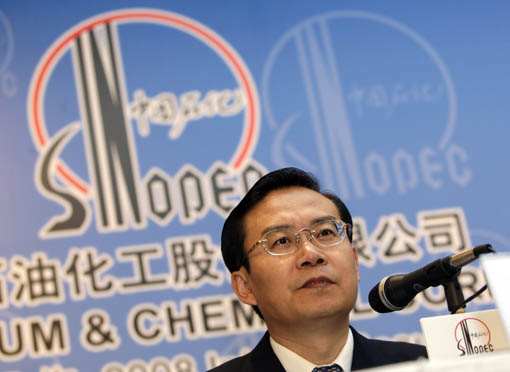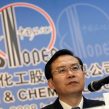
The Rise of the Energy Faction in Chinese Politics
Publication: China Brief Volume: 11 Issue: 7

The appointment earlier this month of Su Shulin, Chinese Communist Party (CCP) secretary and general manager of Sinopec, as acting governor of Fujian Province highlighted the growing clout of the Energy Faction in Chinese politics. Senior executives of the Big Three yangqi (or centrally-controlled firms) in the oil-and-gas sector—Sinopec, China National Petroleum Corporation (CNPC) and China National Offshore Oil Corp (CNOOC)—have frequently been named to top-level provincial positions throughout the past decade. Jiang Jiemin, 55, general manager and party boss of CNPC, deemed the “big brother” among the three monopolies, is about to be made governor of Yunnan Province (Reuters, April 8, Chinareviewnews.com, April 9; China Business Times [Beijing], April 12).
Su and Jiang, who are both alternate members of the CCP’s ruling Central Committee, had in earlier parts of their careers already served in important provincial slots. Su, 49, was a member of the CCP Committee of Liaoning Province from 2006 to 2007. He is a ranking member of China’s Sixth-Generation cadre corps—a reference to up-and-coming officials born in the 1960s. Jiang, 55, who started his career as an oilfield technician in 1972, was vice-governor of Qinghai Province from 2000 to 2004 (Chinavitae.com, April 8; South China Morning Post, April 10). Other top-level officials who earned their first spurs in the petroleum sector include Party Secretary of Hainan Province Wei Liucheng, who is a full member of the CCP Central Committee. Wei, 64, was CEO of CNOOC before being appointed deputy party secretary of Hainan in 2003. Equally significant is the fact that two Politburo members began their careers in the oil-and-gas sector. They are Politburo Standing Committee member in charge of law and order Zhou Yongkang, and Politburo member and Party boss of Tianjin, Zhang Gaoli (Bloomberg.com, April 8; Financial Times, March 3).
The power of the so-called Energy Faction has also been boosted by the increasing prominence of a host of electricity-related yangqi, most of which also run China’s fast-burgeoning nuclear plants. Foremost among these behemoths are the State Grid, China National Nuclear Corporation, China Huaneng Group, and Guangdong Nuclear Power Group (World-nuclear.org, April 13; Energychinaforum.com, March 30). Much more than the oil-and-gas field, the electricity and nuclear firms boast a number of senior executives with the background of princelings (a reference to the offspring of retired leaders). For example, the son and daughter of former premier Li Peng, respectively Li Xiaopeng and Li Xiaolin, have had successful careers in electricity-related corporations. Li Xiaopeng, 51, a former general manager of Huaneng, has served as Vice-Governor, and then Executive Vice-Governor, of resources-rich Shanxi Province since 2008 (Stratfor.com, April 7; Asianews.it [Rome], January 28).
The leaps-and-bounds growth of the energy conglomerates – plus the penetration of their senior managers into politics—has produced the first major CCP faction that is anchored upon an industrial sector (South China Morning Post, April 11; Freepressers.com, March 28; Apple Daily [Hong Kong], April 19). Traditionally, most Chinese cliques have been based on geography and political guanxi (connections). For example, the Shanghai Faction headed by ex-president Jiang Zemin consists of cadres who were either born in the Greater Shanghai Region or who spent the bulk of their career there. The Gang of Princelings is made up of the sons and daughters of party elders. Moreover, the Communist Youth League Faction (CYLF), arguably the CCP’s largest camarilla, comprises officials with close affiliations with the League, which was once headed by President Hu Jintao (Chinaelections.net, March 17; Daily Telegraph [London], January 3).
What is the significance of the rise of the Energy Faction? On the positive side, these industrial behemoths have provided the party-and-government apparatus with relatively capable cadres who are conversant with modern management concepts, including ample exposure to global business norms. This is particularly vital in light of the fact that since the Tiananmen Square crackdown of 1989, the CCP’s Organization Department has put its emphasis on grooming officials known for their unquestioned loyalty to the leadership. In their speeches over the past few years, Director of the Organization Department Li Yuanchao and Vice-President and Central Party School President Xi Jinping have indicated that the criteria for promotion are “morality and ability”—meaning political trustworthiness and professional competence—but with morality taking precedence over ability (People’s Daily, March 16; Xinhua News Agency, August 15, 2009). Having begun their careers in the 1970s as junior workmen and technicians in oil-and-gas fields that are often located in climatically harsh regions, the likes of Su Shulin and Jiang Jiemin are considered to have an ideal combination of “morality” and managerial know-how. It is also not an accident that oil executives are among the first batch of entrepreneurs who have been inducted into the CCP’s Central Committee.
The downside of the flourishing Energy Faction is that the dozen-odd oil-and-gas and electricity conglomerates seem to have become too powerful for individual State Council departments to handle. Moreover, their monopolistic status militates against the overall spirit of economic liberalization and marketization, which underpins China’s 33 year-old Reform and Open-Door policy. Last year, the three oil corporations raked in profits of 265 billion yuan ($40.58), up 35.7 percent over that of 2009. Particularly given that petroleum and petrochemical products in China are often more expensive than those in the West, calls have been made for these super-rich corporations to “return wealth to the people” (China News Service, March 29; Xian Evening Post, March 29).
More significantly, in view of the record number of Energy Faction-affiliated executives who have snared senior party and government slots, questions about lack of proper scrutiny—and inadequate checks and balances—have loomed ever larger. Like other yangqi such as the four major commercial banks, the energy conglomerates are in theory under the direct control of the State Assets Supervision and Administration Commission (SASAC). Yet, given that the ministerial-ranked SASAC has the same party and administrative status as most of the state-held giants, it would be hard-put for the commission to maintain a tight grip over their charges (See “Chinese SOEs a Target of Hu-Wen’s “Inclusive Growth?” China Brief, January 14). Perhaps in view of these concerns, the State Council set up early last year a high-level National Energy Commission (NEC) to take charge of energy policy as well as to oversee energy-related state firms. Its Director and Vice-Director are respectively Premier Wen Jiabao and First Vice-Premier Li Keqiang. Yet, the day-to-day work of the commission, which does not meet regularly, is handled by the National Administration of Energy, which is another ministerial-level unit (People’s Daily, January 27, 2010; Epmag.com [Houston], February 9, 2010). Despite the NEC’s star-studded membership, there is little evidence that it has enabled central party-and-state authorities to exercise tighter oversight over the energy behemoths.
There are also fears that the relentless trend of the fusion of business and politics within the energy sector might exacerbate corruption. This is in light of a number of high-profile graft scandals that have hit the oil and nuclear sectors in the past few years. For example, former Sinopec Chairman Chen Tonghai was given a suspected death sentence in 2009 for pocketing ill-gotten gains worth more than $28 million. A year later, then chairman of the China National Nuclear Corp Kang Rixin was jailed for life for accepting some $1 million in bribes. Kang was also stripped of his membership in the CCP Central Committee (Financial Times, July 16, 2009; BBC News, November 19, 2010).
The overweening clout of the Energy Faction is also evidenced by the controversy over whether China should press ahead with its ambitious nuclear-energy blueprint after the debacle of the Fukushima Dai-Ichi Plant in Japan. Within a week of the nuclear-leakage crisis, Premier Wen declared a temporary moratorium on the approval of new nuclear reactors in China. Relevant State Council organs also started examining the safety standards of existing facilities as well as those under construction. 26 nuclear plants are being built in China, and at least 28 are planned for the coming decade (Xinhua News Agency, March 19; Ming Pao [Hong Kong], March 19).
China is unlikely to emulate countries such as Germany in announcing a halt on all nuclear plants. Premier Wen’s cautionary gesture notwithstanding, lobbyists for the pro-nuclear lobby have been vocal in their claims that the Japan accident is “irrelevant” to China’s energy calculations. Cai Guohan, a senior researcher on nuclear radiation in the Ministry of Environmental Protection, indicated that for China to slow down its nuclear program “will be tantamount to stop eating for fear of choking.” Cai also asserted that China’s coastal topography would render the country less susceptible to tsunami-related damages. China National Nuclear Corp specialist Chen Zhuzhou also contended that because most of China’s reactors were using 21st-century technology, “our safety equipment and standards are much better than those in Japan” (Xinhua News Agency, March 29; Sina.com, March 26; Global Times, March 18).
In an apparent attempt to convince critics that the central government has the wherewithal to rein in the Energy Faction, the SASAC announced last week that both Sinopec and CNOOC would be setting up Western-style boards of directors to run their operations. It is understood that CNPC would introduce a similar reform soon. (Subsidiaries of the three oil giants, which are listed on the Hong Kong stock market, are already managed by boards of directors). Yet it is too early to tell whether the mere creation of a board of directors would either bring about a significant improvement in corporate governance or enable the State Council to keep closer tabs on the yangqi’s business practices. After all, thirty other yangqi under the SASAC had already set up management boards as of the end of 2010 (China News Service, April 13; Nanfang Daily [Guangzhou], April 13). The fast-growing tentacles of the Energy Faction may ensure that only officials and executives who fervently back its sectoral interests would be appointed to the relevant boards.





